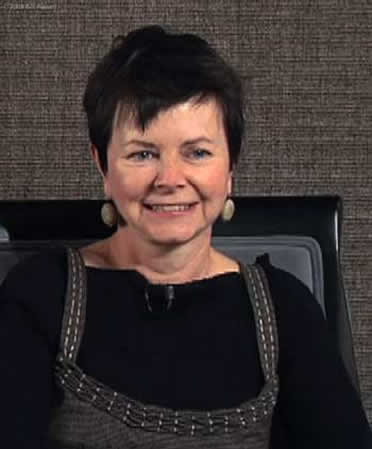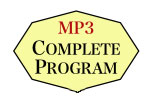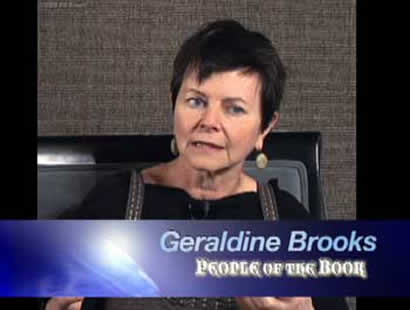 |
Geraldine Brooks... writer. A multi-faceted author, Ms. Brooks’ prize-winning novels include People of the Book which brings fiction and fact together in novel form, as she did in Year of Wonders and her Pulitzer Prize winner, March. Her non-fiction includes Nine Parts of Desire: The Hidden World of Islamic Women and Foreign Correspondence. Ms. Brooks was The Wall Street Journal correspondent in Bosnia, Somalia and the Middle East. A native of Australia and married to author Tony Horwitz, she and her family live on Martha’s Vineyard after a number of years in rural Virginia. |
An enduring invention -- the book -- is as powerful as the story within it in the hands of reporter-turned-novelist Geraldine Brooks, who champions books themselves as “fantastic”. Having won the Pulitzer Prize for fiction with March, Ms. Brooks drew on her experience as The Wall Street Journal correspondent in Bosnia, Somalia and the Middle East writing People of the Book.
“I was in Sarajavo as a newspaper reporter and heard about this famous manuscript, the Sarajevo Haggadah. It’s the Hebrew manuscript from fourteenth century Spain. It was missing from the Bosnian National Library and it was at risk. Nobody knew what its fate was.
“The truth that (People of the Book) testifies to is that the Haggadah always finds its protectors. We know of two rescues of this Hebrew book by Muslim hands and then once by a Catholic priest in Venice in 1609. Very ugly things might be happening around it, but the book was at the center of some really beautiful acts of courage, outreach by people who would not be taken in by this ideology that ‘The Other’ is despicable. They actually felt the shared humanity and the shared intellectual history that this book represented.”
The factual roots of her story are as gripping as the specific story she relates.
“What makes this Haggadah so remarkable is that it is famous. You can feel the intention of the scribe, the sofer, the religious man whose role in life is to write holy Hebrew. You can feel the intensity of creative power of the artist who did the illuminations in this book, which makes it such a extraordinary rarity because at that time it was very unusual for any Hebrew book to have figurative art because of the commandment, ‘Thou shalt not make graven images’.
“One of the great eyewitness accounts of the expulsion of the Jews in 1492 comes to us from Columbus. He was down at the dock and saw this pathetic huddled mass of Jews who had been given a date certain on which to leave Spain or else.”
It is also factual that in 1609, the Haggadah did not fall victim to centuries of cruelties imposed by the Roman Catholic Church’s Inquisition, she reports.
“The priest in question was a censor working for the Pope’s Inquisition. The priest’s job was to root out heretical Jewish books and burn them. This book came under his hand and he wrote three little Latin words that proclaimed that there was nothing against the Catholic Church in the book. So it was saved from being burned in Venice that year.”
Twice it was rescued by those who followed the teachings of Islam, once 150 years ago and again, as she discovered, in Sarajevo. It was one of many brave act among professionals she considers heroic -- librarians.
“They did in fact find the book. It wasn’t lost actually. A very courageous Muslim librarian realized that this war (in the former Yugoslavia) might be serious, long-term and very destructive. So he risked his life to go in under shelling and bring this book to a safe place where he hid it for duration of the war.
“I think some of the way Jewish history is presented even in the Jewish community is very holocaust-centric. (I went) back into the past to show the patterns that have repeated themselves, patterns of tolerance followed by persecution.”
[This Program was recorded January 15, 2008, in Atlanta, Georgia, U.S.]
audio content:
Conversation 1 |
Conversation 2 |
Conversation 3 |
Conversation 4 |
Conversation 5 |
Conversation 6 |
 7:25 7:25 |
 10:46 10:46 |
 10:33 10:33 |
 12:08 12:08 |
 13:05 13:05 |
 3:33 3:33 |








